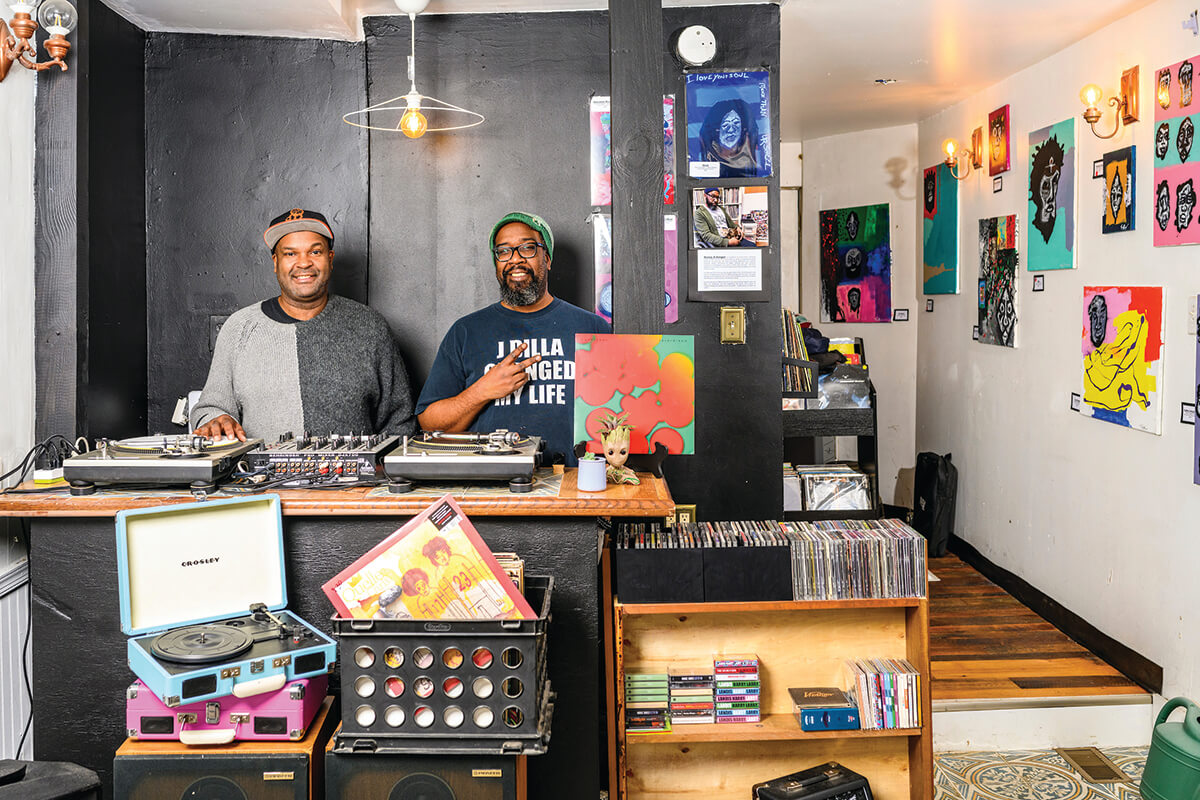Arts & Culture
Mount Vernon Records is a One-Stop Shop for Local Creatives
Founders aim to be a go-to for vinyl and music merch, but their overall goal is to be "a hub for artists and musicians.”

At Mount Vernon Records on West Read Street, there’s a lot to browse.
Sifting through crates, you’ll happily stumble across old-school Jackson Browne vinyl or the new LP from Annapolis’ own Swampcandy—but not because the records are categorized alphabetically or by genre. That’s by design. Founders William Hicks and Aaron Spence want guests to stay awhile—and thumb through everything inside the store.
“It’s more fun when you don’t know what you’re looking at first,” says Hicks, 52, a Columbia native and veteran DJ. “A lot of DJs who are looking into sampling will sit there and scour the entire record store. We wanted to give you that energy. It opens up your brain. There’s more connection.”
This is the kind of creativity that this small storefront on the western edge of Mt. Vernon hopes to foster. Inside, bright canvas paintings made by local artists line the walls and wheeled record crates cover the tile floor. Store visitors are encouraged to roll one over to a chair and start digging.
Hicks and Spence, also a DJ, opened the doors this past October. In addition to vinyl—both new and well-worn—they also sell CDs, cassette tapes, and other merchandise, although their goal is to be more than just a store, but also, “a hub for artists and musicians.”
“That’s our community,” says Spence, 50. “We’re artists ourselves. That makes us different.”
Originally from Detroit, Spence’s love of vinyl took off throughout his DJing career, which eventually brought him to Baltimore. For Hicks, it started with his mother, who had expansive taste in music.
“I remember the first time I heard George Gershwin’s ‘Rhapsody in Blue,’ and I was blown away,” Hicks says. “But then, my mom would throw on ‘Down Home Blues’ by Z. Z. Hill, or Frampton Comes Alive! When I say she listened to everything, I mean we had classical records, we had blues, we had funk, we had rock ’n’ roll—anything that caught her ear. If I was listening to something edgy”—like AC/DC’s “Highway to Hell,” for instance—“instead of saying ‘No, you can’t listen to that,’ she’d ask what I was getting out of it, she’d talk to me about it.” This helped Spence to broaden his own musical horizons.
To that end, headsets and turntables sit throughout the shop in hopes that patrons might find their own inspiration in the store’s eclectic collection.
“Whenever anyone comes in, the first thing that we say to them is ‘Welcome,’” Hicks says. “‘Do whatever you want, walk around, enjoy yourself.’ Obviously, we want people to buy vinyl. But if you also have the energy to sit there and say, ‘You know what, I want to learn to play guitar,’ we want to foster that energy, too.”
He’s referring to forthcoming programming that includes an array of artistic offerings for audiophiles beyond just listening, from group workshops for budding musicians and DJs to a podcast room that will be available for the community to rent and use.
“We want people to know that this is not just a space for us to be,” says Hicks, “but a space for you to be, as well.”
Known to stand outside the door and wave to passersby, the owners really mean that. Recently, a group of students from the neighborhood walked in and made themselves at home.
“You don’t mind us hanging out?’” they asked.
“Hang out!” Hicks said. “Wanna listen to some records? Let me know.”